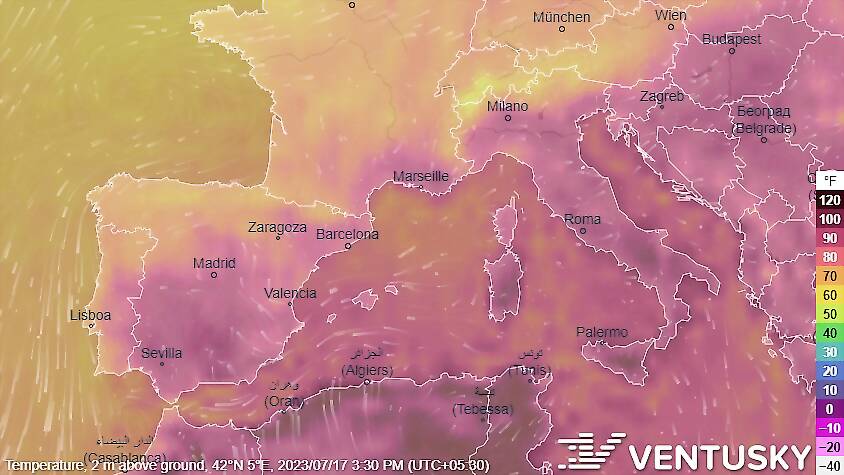
views
A deadly heatwave is sweeping across Europe with temperatures in Italy in the coming days set to break the previous records. Italy has issued hot weather red alerts for 16 cities on Sunday, as the mercury is expected to surpass the European temperature record.
The heat has affected travel plans for those who are heading to holiday destinations across the continent. Other countries including Spain, France, Germany and Poland are expected to see extreme heat waves in the coming days.
As a result of the soaring temperatures, Greece shut the Acropolis of Athens, one of Greece’s top tourist attractions, for the third straight day on Sunday. In the Vatican, people at the St Peter’s Square are dunking their hats in its famous water fountain and sheltering under flags to keep cool. Animals in Rome’s Zoo are being fed frozen food to help keep them cool.

A wildfire broke out on La Palma Island in Spain’s Canary Islands burning several homes and forced the evacuation of 500 people on Saturday. In France, the heat and resulting drought are posing a threat to the farming industry.
Will the Heat Break Record in Europe?
Amid a red alert, forecasters in Italy have told people to prepare for “the most intense heatwave of the summer and also one of the most intense of all time”.
The thermometer is likely to hit 40 degrees Celsius in Rome by Monday and even 43 Degrees on Tuesday, smashing the record of 40.5 Celsius set in August 2007.

The temperatures in Sicily and Sardinia are set to reach “the hottest temperatures ever recorded in Europe” as the mercury is expected to touch as high as 48C, the European Space Agency warned.
This June was the second-hottest on record in France, according to the national weather agency, and several areas of the country have been under a heatwave alert since Tuesday.
What is Causing Severe Heat in Europe?
The current heatwave in Europe is being caused by an anticyclone named Cerberus, named after the three-headed monster that features in Dante’s Inferno.

An anticyclone or a high-pressure system is a normal phenomenon in which sinking air from the upper atmosphere brings about a period of dry and settled weather with limited cloud formation and little wind.
High-pressure systems means that the winds are gentle and as the air sinks, it warms up, leading to warm and dry weather. It tends to be slow moving, which is why they persist for days or weeks at a time, according to The Conversation.
When an anticyclone forms over hot land, in regions like the Sahara, it generates even hotter temperatures because the existing warm air is heated even more.

Eventually, the phenomenon breaks down and the heatwave will come to an end. However, the Cerberus heatwave is expected to persist for around two weeks, according to the Italian Meteorological Society.
Moreover, the Italian weather forecasters are warning that the next heatwave, dubbed Charon, will further push temperatures back up towards 43 Degrees Celsius in Rome and a possible 47 degrees on the island of Sardinia.
Is Climate Change to Blame?
High pressure systems, which is currently causing heatwave in Europe, have been moving northwards in recent years. According to experts, it’s difficult to ascribe a single event like a heatwave directly to climate change.
However, with the rising temperatures, there have been changes in atmospheric circulation patterns that can result in increased occurrences of extreme temperatures and droughts in Europe.
Week 256. We are currently shattering heat records all over the world. Last week we experienced the hottest days ever recorded, many days in a row. We are also experiencing record high sea level temperatures and record low ice levels. This is an emergency. #FridaysForFuture pic.twitter.com/S2IlK0leoS— Greta Thunberg (@GretaThunberg) July 14, 2023
Research by the Intergovernmental Panel on Climate Change stated that there is an increase in the frequency and magnitude of extreme weather events since the 1950s and an increasing severity over the past two decades.
The European Union’s Copernicus Climate Change Service have attributed these unusually hot conditions to climate change and suggested that such events are likely to be more frequent, intense and longer.
Will Europe See a Respite in Coming Days?
Europe is not likely to see respite from the soaring temperatures as the Southern part of the continent is bracing for a second heat storm in a week.
After anticyclone Cerberus, another High-pressure systems is pushing into the region from north Africa. The anticyclone is set to affect Italy, Greece, Spain, Morocco and other Mediterranean countries.
The European Space Agency has said that this week could bring the hottest temperatures ever recorded in Europe, according to The Guardian.
















Comments
0 comment